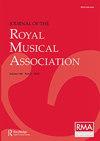‘There shall be no musical servitude’: Towards a Multitudinous Shostakovich in the West
IF 0.5
2区 艺术学
0 MUSIC
引用次数: 0
Abstract
Ideologically motivated attempts to elucidate Shostakovich’s political views and to determine whether and how they may be coded into his compositions have come to characterize the Western reception of the composer’s works since his death in 1975. Fuelled by the political oppositions of the cold war, Shostakovich’s posthumous reputation in the West has been largely shaped by two conflicting perspectives. These have positioned him on the one hand as a secret dissident, bent and broken under the unbearable strain of totalitarianism, made heroic through his veiled musical resistance to Communism; and on the other hand as a composer compromised by his capitulation to the regime – represented in an anachronistic musical style. Both perspectives surrender Shostakovich and his music to a crude oversimplification driven by vested political interests. Western listeners thus conditioned are primed to hear either the coded dissidence of a tragic victim of Communist brutality or the sinister submission of a ‘loyal son of the Communist Party’.1 For those prepared to accept Shostakovich as a ‘tragic victim’, the publication of his purported memoirs in 1979, ‘as related to and edited by’ the author Solomon Volkov, presents a tantalizing conclusion: bitterly yet discreetly scornful of the Stalinist regime, Shostakovich was indeed a secret dissident and this dissidence was made tangible in his music.“不应该有音乐奴役”:走向西方多元化的肖斯塔科维奇
自1975年肖斯塔科维奇去世以来,西方对肖斯塔科维奇作品的接受,是出于意识形态的动机,试图阐明肖斯塔科维奇的政治观点,并确定这些观点是否以及如何被编码到他的作品中。在冷战时期政治对立的推动下,肖斯塔科维奇死后在西方的名声在很大程度上受到两种相互冲突的观点的影响。这使他一方面被定位为一个秘密的持不同政见者,在极权主义的难以忍受的压力下弯曲和破碎,通过他对共产主义的隐晦的音乐抵抗而成为英雄;另一方面,作为一个作曲家,他屈服于对政权的投降,以一种不合时宜的音乐风格表现出来。这两种观点都将肖斯塔科维奇和他的音乐屈从于一种由既得利益政治驱动的粗糙的过度简化。因此,西方听众要么习惯于听到共产主义暴行的悲惨受害者的隐晦的异议,要么是“共产党忠诚的儿子”的邪恶顺从对于那些准备接受肖斯塔科维奇是一个“悲剧受害者”的人来说,1979年他的回忆录的出版,“与作者所罗门·沃尔科夫有关并由他编辑”,提出了一个引人注目的结论:肖斯塔科维奇确实是一个秘密的持不同政见者,这种不同政见者在他的音乐中表现得很明显。
本文章由计算机程序翻译,如有差异,请以英文原文为准。
求助全文
约1分钟内获得全文
求助全文
来源期刊
CiteScore
0.50
自引率
0.00%
发文量
16
期刊介绍:
The Journal of the Royal Musical Association was established in 1986 (replacing the Association"s Proceedings) and is now one of the major international refereed journals in its field. Its editorial policy is to publish outstanding articles in fields ranging from historical and critical musicology to theory and analysis, ethnomusicology, and popular music studies. The journal works to disseminate knowledge across the discipline and communicate specialist perspectives to a broad readership, while maintaining the highest scholarly standards.

 求助内容:
求助内容: 应助结果提醒方式:
应助结果提醒方式:


